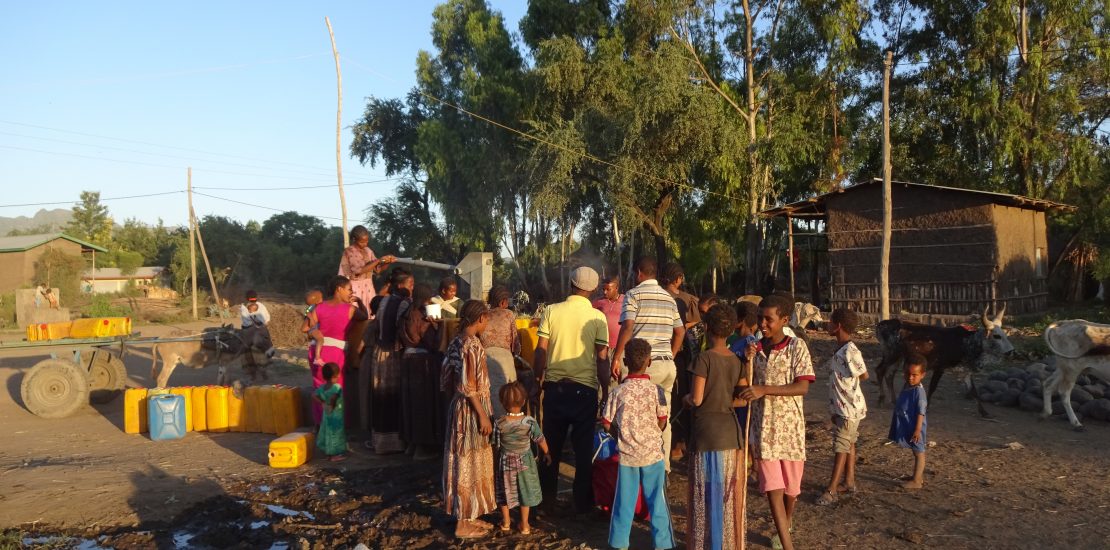Boreholes key to drought resilience in Ethiopia, new study shows
- August 23, 2019
- Posted by: administrator
- Category: Environmental, Water Issues, Africa

Installing more boreholes to tap underground water will improve rural Ethiopian communities’ resilience to drought, according to a new report.
Research carried out by the British Geological Survey (BGS), the University of Addis Ababa and the Overseas Development Institute (ODI) shows that people who have access to groundwater from boreholes are much less affected by drought than those who rely on wells or springs for their water supply.
The report also links the shortage of water to conflict in local areas, migration, declines in breastfeeding, rises in miscarriages and more children missing school.
Groundwater experts from the British Geological Survey monitored 19 hand-dug wells, springs and boreholes in two districts in northern Ethiopia over 18 months.
They also held focus group discussions with local people, including school and health centre staff near each of the groundwater sources.
The team found that boreholes drilled to 50-100m were the most reliable source of water during the extended drought of 2015/16 and through the dry season.
Professor Alan MacDonald, the hydrogeologist who led the research, said:
“We found that boreholes equipped with handpumps were more reliable than springs or hand-dug wells, and this reliability is not affected by drought or seasonal change.
“As hand-dug wells dried up and springs failed, the boreholes we monitored gave exactly the same flow throughout the year.
“Boreholes also had better water quality. As the drought ended and rain started falling many of the springs and hand-dug wells became grossly contaminated.
“The boreholes performed much better, with less than half of them showing any level of contamination.
“Our findings make a clear case for the installation of more boreholes to improve resilience to drought. If constructed carefully and regularly maintained, boreholes can transform the water security for rural villages and make them much more resilient to the effects of climate change.”
Dr Seifu Kebede, from Addis Ababa University’s Earth Sciences department, said:
“A significant finding of our study is the length of time people without boreholes spent in water collection during the dry season and drought, and the very low volumes of water they were able to collect.
“People were routinely queuing for up to 10 hours, which led to tension and sometimes violence, and had wide-ranging impact across communities.”
School attendances down and all health centres in study area reported increases in diseases
Other issues identified in the study included a reduction in farmwork to help collect water, while school attendance was down in all but one district, as children were involved in water collection.
All health centres in the study area also reported increases in diseases, and, in some cases, employees were paying for water collection to keep the centres functioning.
“We must look at how communities source water during a normal dry season to predict how they will cope during drought years. This study shows that boreholes, where they can be installed, could be the most reliable source of groundwater in these areas of northern Ethiopia.” Dr Kebede added.
According to BGS’s African Groundwater Atlas, Ethiopia has a high potential for groundwater in the highland regions due to the mostly permeable rocks. A major challenge, however, is the rugged terrain, which can hinder the movement of drilling rigs.
In the Ethiopian Highlands, rainwater infiltrates through the underlying volcanic rock over decades and centuries to collect in fractures and cracks in the rock to form aquifers.
The groundwater naturally flows slowly to flow out at springs and rivers, or can be accessed by drilling boreholes and installing handpumps or motorised pumps.
Since it is replenished at a different time scale to rivers it means that groundwater is available when other sources dry out.
The project was funded by the Natural Environment Research Council (NERC) and the Department for International Development.
